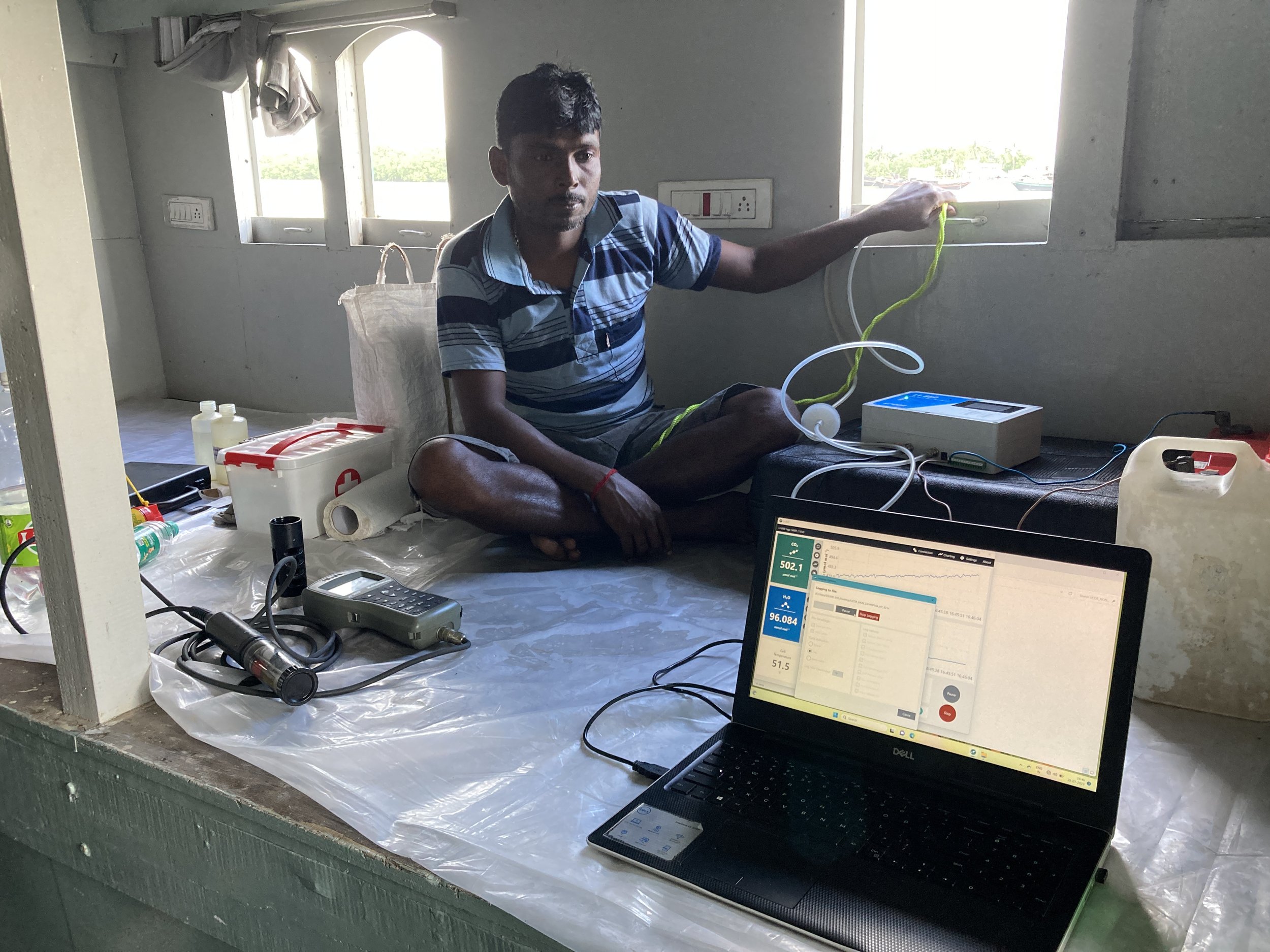Indian Sundarban Fieldwork July 2023
By Virginia Panizzo, Abhra Chanda, Tuhin Ghosh, Shruti Thakur, Souvik Shil , Susmita Das
YSI EXO1 probe, no longer working after arrival in the field (Ginnie Panizzo)
On the 25th July began our Indian Sundarban pond sampling fieldwork, with my arrival in Kolkata. True to Living Deltas form, the arrival while otherwise very smooth, was beset by lost luggage. Luckily, it arrived from the connection in Mumbai the next day meaning that the party were ready to leave Kolkata and head to the launch at Canning on the morning of the 27th July. Our party consisted of Abhra Chanda, Tuhin Ghosh, Shruti Thakur, Souvik Shil and Susmita Das where we met Sanjoy and his team to take us to the first of our two sampling points at Pakhiralaya, Gosaba Island.
As we approached the first sites, we began arranging our field equipment and calibrating the YSI probe only to find out that the screen was no longer working on our EXO 1. We had to think on our feet, very quickly. In the interest of time, we collected our littoral and water samples from the first sites so that we could begin filtering while we put our thinking caps on.
After a long evening of filtering, with intermittent power outages at the resort, we finally decided on a solution. Luckily the WP3 monsoon routine river sampling was also currently happening and Souvik and the rest of the crew were a few km away. We decided to meet up with them the following morning after they had completed their low tide sampling, pick up their probe and head to our island sites on Kumirmari. On the way back we could then drop off the probe for their high tide sampling. It also provided the chance to pick up their second filtration unit and pump so we could halve our filtering time in the lab we had set up on the boat. This would be our arrangement for the rest of the sampling days and it also provided a great opportunity to see the river sampling taking place. The day after, Souvik joined us with the probe to use in between his low and high tide sampling time gap.
Abhra and Ginnie busy filtering samples on the boat after day 2 of sampling ponds (Ginnie Panizzo)
One of Sanjoy’s team helping Souvik run the Licor measurements for the estuarine monitoring scheme (Ginnie Panizzo)
Our sites cover a range of dominant pond usage across the delta: domestic ponds, aquaculture (brackish shrimp), abandoned ponds, irrigation ponds and community ponds. As well as ponds close to resorts which were seeing a lot of activity as our trip coincided with World Tiger Day. That weekend the Sundarbans are awash with tourist boats and excursions.
The community pond on Bali island that had been limed the day before in an attempt to improve water quality (Ginnie Panizzo)
True to form, Sanjoy’s crew have been taking great care of the research team and the food…well, what can I say. A veritable feast, breakfast, lunch, snack time (aka “British dinner time”) and Indian dinner time. The refreshments are equally flowing, which were very welcome in the high monsoon humidity.
Over the course of the fieldwork campaign, we visited ponds and local communities on Kumirmari, Chhotamollakhali, Satjelia, Pakhirala and Bali Islands keeping consistency in the ponds that we sampled along this north to south transect. Susmita and Shruti carried out a brief survey directed at the land owners to understand how they maintain their ponds (e.g. water treatment, dredging, usage) and any changes they notice in its nature. This will provide very valuable metadata to better constrain some of the possible drivers for water quality across the region. We have collected samples for major nutrient analysis (phosphorus, nitrogen), E. Coli concentrations, algal pigment and diatom community assemblages and carbon species (dissolved, particulate). Together this will provide an assessment of water quality, identifying possible health risks for the local communities.
A domestic pond on Bali Island (Ginnie Panizzo)
The day before we left, we took a tour of the forest, with Souvik also taking a well-deserved afternoon rest from the week’s long routine monitoring and joining us. Unfortunately, this was the one day that the heavens opened and we have almost non-stop rain. Although this made for a damp day, it was incredibly atmospheric. Our last day, saw a return to Bali Island after my last visit in 2019. It was great to be back and visit some of the ponds that we first sampled almost 4 years ago. Our final farewell to the delta was met with a glorious sunset. On return to Kolktata, I had the chance to pack up the remaining samples for their safe transport to the UK. Indrajit Pal (AIT-Bangkok) was also visiting Kolkata, so we had a farewell lunch the afternoon before my flight to share with him our Sundarban adventures. Long may these continue.
The farewell to Sanjoy and his crew after a very successful week in the field (Ginnie Panizzo)
Our plans are to conduct the same sampling in November-December 2023 (post monsoon) and March-April 2024 (pre-monsoon) so that we have a full annual cycle to completement the river monitoring regime. To our Sundarban team and the wonderful and generous villagers of this unique landscape, thank you. In particular, without the delta communities support, knowledge exchange and cooperation, this research would not be possible.
The sunset after day two of sampling (Ginnie Panizzo)
Indrajit Pal joining the rest of the group for lunch before Ginnie departed for the UK (Ginnie Panizzo)








